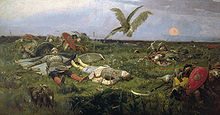Igor song
The Tale of Igor ( Altostslawisch Слово о плъку Игоревѣ Slovo o pluku Igorevě ; modern Russian Слово о полку Игореве Slovo o polku Igorewe ; literally "Song of the Helgeland Igors ") is an anonymous , medieval epic of Rus .
Bulk
It deals with the unsuccessful campaign undertaken in 1185 by the Russian prince Igor Svyatoslawitsch of Novgorod-Seversk against the Polovz princes, which brought him into captivity, but from which he escaped. The igorong laments the disagreement among the Russians and the lack of a central ruler. An often quoted excerpt from the Igor song: “It is difficult for the head / to be without a shoulder. / But it is just as unfortunate / for the body to be without a head. "
The poetry is not very extensive with 218 stanzas. The manuscript was discovered in 1795 when the landowner Alexei Ivanovich Mussin-Pushkin bought it from the monks of the Yaroslavl monastery along with other manuscripts. He made a copy for Catherine the Great and published the song in 1800 with the help of the paleographers Alexei Malinowski and Nikolai Bantysch-Kamensky. The only surviving original manuscript burned with the library of Mussin-Pushkin during Napoleon's invasion in 1812 in the great fire of Moscow . In the 19th century the work became particularly popular in Eastern Europe, but also in Germany, where it was translated by Rainer Maria Rilke , among others . Alexander Borodin's opera Fürst Igor with the famous Polovtsian dances is based on the Igor song.
The authenticity of the igorong was and is in part still doubted by some researchers today. An important point is the relationship to the epic about the Battle of the Don , with which it has parts of the text in common.
Excerpt from the igor song

Igor looked up at the bright sun,
and saw all his warriors
shrouded in darkness.
And Igor said to his Druzhina :
“Brothers and warriors!
Better to fall in battle
than to starve in captivity.
Let's mount our swift horses, brothers!
Let's see the blue Don River . "
And Igor's spirit was seized with zeal.
And the desire to drink from the great Don River
hid the bad omen from him.
And so he said:
“I want to break the spear at the Polowz border .
I want, oh my Russians,
either to drink Don water from my helmet with you
or to leave my head there. “
Oh Bojan , nightingale of yore!
If you would sing of the glory of the Russian campaign, you would
fly like a nightingale over the tree of wisdom,
your spirit would fly high above the clouds
and proclaim the glory of these times.
You would be walking on Trojan's path ,
across the plains and mountains.
And the grandson of Wolos
would sing Igor's song:
“It is not a storm that drove
the hawks across the plains.
It is a flock of wild ducks
moving towards the great Don River. "
Or you, seer Bojan, grandson of Wolos, would sing:
“Warhorses snort from behind the river Sula .
Fame echoes in the city of Kiev .
Fanfares ring out in the city of Novgorod .
Banners fly over the city of Putivl . "
Work editions
- The song of the Ierfahrt army - German translation by Harald Raab. In: Helmut Graßhoff and others: O Bojan, you nightingale of the old days. Seven centuries of ancient Russian literature . Frankfurt am Main: Verlag Heinrich Scheffler 1965.
- Medieval Russian Epics, Chronicles, and Tales: Revised Edition by Serge A. Zenkovsky , ISBN 0-452-01086-1 (English)
- Slovo o Polku Igoreve, Igorja, syna Svjateslavlja, vnuka Ol'gova. Pesnja from pachodze Ihara. The Lay Of The Warfare Waged By Igor, Son Of Svyatoslav, Grandson Of Oleg. Illustrated by Pavel Tatarnikov. Translated from Old Russian into Belarusian by Yanka Kupala, translated from Old Russian into English by Irina Petrova. Preface by Anatol Butevich. Minsk: Kavaler Pablischers, 2003. ISBN 985-6427-68-1 (old Russian, Belarus., English)
- The Igor song: a hero poem. The old Russian text with the translation by Rainer Maria Rilke and the New Russian prose version by DS Lichatschow. Leipzig: Insel-Verlag 1985. Insel-Bücherei, No. 689
See also
literature
- Filip, Ota: The Igor Song , in: Karl Corino (ed.): Forged! Fraud in politics, literature, science, art and music . Frankfurt am Main 1990, ISBN 3-8218-1131-5 , pp. 209-217 (with arguments for the inauthenticity).
Web links
- Text of the igor song in Old East Slavic with links to various Russian translations
- German translation by Rainer Maria Rilke ( Memento from February 12, 2007 in the Internet Archive )
- Encyclopedia of the Igore Song (Russian)
- The House of Count Aleksei Musin-Pushkin (1744-1818) in St. Petersburg. Here was stored the Tale of Igor's Campaign (Russian)
